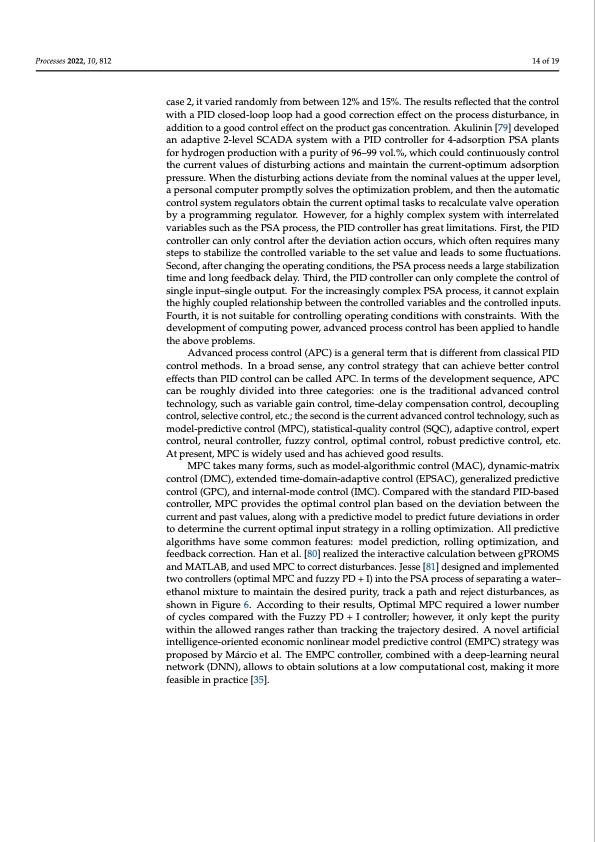
PDF Publication Title:
Text from PDF Page: 014
Processes 2022, 10, 812 14 of 19 case 2, it varied randomly from between 12% and 15%. The results reflected that the control with a PID closed-loop loop had a good correction effect on the process disturbance, in addition to a good control effect on the product gas concentration. Akulinin [79] developed an adaptive 2-level SCADA system with a PID controller for 4-adsorption PSA plants for hydrogen production with a purity of 96–99 vol.%, which could continuously control the current values of disturbing actions and maintain the current-optimum adsorption pressure. When the disturbing actions deviate from the nominal values at the upper level, a personal computer promptly solves the optimization problem, and then the automatic control system regulators obtain the current optimal tasks to recalculate valve operation by a programming regulator. However, for a highly complex system with interrelated variables such as the PSA process, the PID controller has great limitations. First, the PID controller can only control after the deviation action occurs, which often requires many steps to stabilize the controlled variable to the set value and leads to some fluctuations. Second, after changing the operating conditions, the PSA process needs a large stabilization time and long feedback delay. Third, the PID controller can only complete the control of single input–single output. For the increasingly complex PSA process, it cannot explain the highly coupled relationship between the controlled variables and the controlled inputs. Fourth, it is not suitable for controlling operating conditions with constraints. With the development of computing power, advanced process control has been applied to handle the above problems. Advanced process control (APC) is a general term that is different from classical PID control methods. In a broad sense, any control strategy that can achieve better control effects than PID control can be called APC. In terms of the development sequence, APC can be roughly divided into three categories: one is the traditional advanced control technology, such as variable gain control, time-delay compensation control, decoupling control, selective control, etc.; the second is the current advanced control technology, such as model-predictive control (MPC), statistical-quality control (SQC), adaptive control, expert control, neural controller, fuzzy control, optimal control, robust predictive control, etc. At present, MPC is widely used and has achieved good results. MPC takes many forms, such as model-algorithmic control (MAC), dynamic-matrix control (DMC), extended time-domain-adaptive control (EPSAC), generalized predictive control (GPC), and internal-mode control (IMC). Compared with the standard PID-based controller, MPC provides the optimal control plan based on the deviation between the current and past values, along with a predictive model to predict future deviations in order to determine the current optimal input strategy in a rolling optimization. All predictive algorithms have some common features: model prediction, rolling optimization, and feedback correction. Han et al. [80] realized the interactive calculation between gPROMS and MATLAB, and used MPC to correct disturbances. Jesse [81] designed and implemented two controllers (optimal MPC and fuzzy PD + I) into the PSA process of separating a water– ethanol mixture to maintain the desired purity, track a path and reject disturbances, as shown in Figure 6. According to their results, Optimal MPC required a lower number of cycles compared with the Fuzzy PD + I controller; however, it only kept the purity within the allowed ranges rather than tracking the trajectory desired. A novel artificial intelligence-oriented economic nonlinear model predictive control (EMPC) strategy was proposed by Márcio et al. The EMPC controller, combined with a deep-learning neural network (DNN), allows to obtain solutions at a low computational cost, making it more feasible in practice [35].PDF Image | Numerical Research on the Pressure Swing Adsorption Process

PDF Search Title:
Numerical Research on the Pressure Swing Adsorption ProcessOriginal File Name Searched:
processes-10-00812-v2.pdfDIY PDF Search: Google It | Yahoo | Bing
CO2 Organic Rankine Cycle Experimenter Platform The supercritical CO2 phase change system is both a heat pump and organic rankine cycle which can be used for those purposes and as a supercritical extractor for advanced subcritical and supercritical extraction technology. Uses include producing nanoparticles, precious metal CO2 extraction, lithium battery recycling, and other applications... More Info
Heat Pumps CO2 ORC Heat Pump System Platform More Info
| CONTACT TEL: 608-238-6001 Email: greg@infinityturbine.com | RSS | AMP |